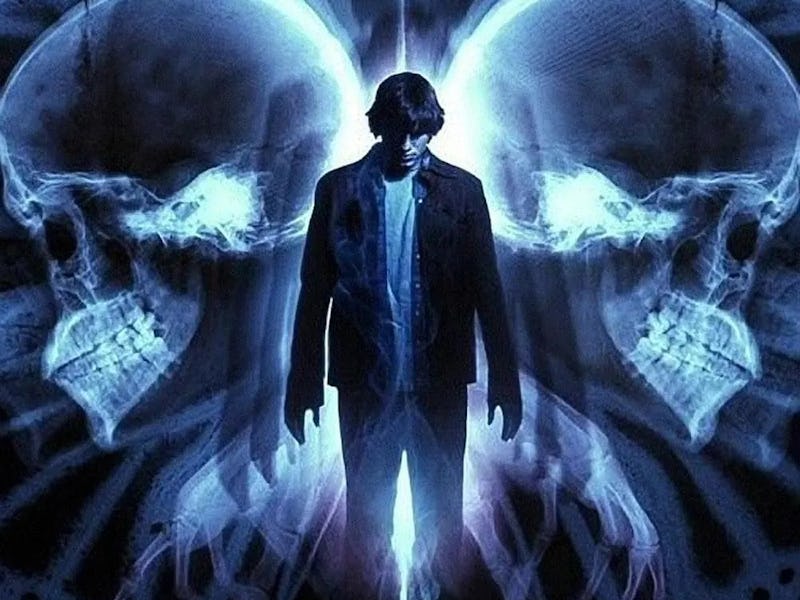Ashton Kutcher, Of All People, Made a Hugely Underrated Time-Travel Thriller
Are you brave enough to revisit the horrors of... 2004?

The Butterfly Effect may not go down as one of sci-fi’s most impactful and intense tragedies of circumstance, but it deserves better than the critical drubbing it received in 2004. Today, free of the mockery star Ashton Kutcher tended to attract, it can be appreciated as a heartbreaking gut-punch. Between Kutcher’s surprisingly inspired dramatic performance, the film’s unfettered willingness to push boundaries and present unsettling realities, and its raw emotional core — one of the best examples of “it’s better to have loved and lost” in genre cinema — the singular experience it provides withstands the test of time better than one would assume.
Say what you will of him nowadays, but in 2004, Kutcher was beloved... for being a funny, light-hearted guy. He was doing Punk’d and starring in rom-coms and wacky comedies, at least until Eric Bress and J. Mackye Gruber’s The Butterfly Effect came along. It’s always satisfying when a performer known for their levity is given something dramatic to chew on: think Jim Carey in Eternal Sunshine of the Spotless Mind, or Will Farrell in Stranger Than Fiction. Kutcher may not have felt like an actor capable of pulling that transition off, but despite doubts, he was a natural at tapping into the nuances of Evan Treborn.
Treborn finds himself dealing with personal demons as a result of once-blacked-out periods of his life starting to return to him as harrowing memories. The movie follows his attempts to relive these muddled moments to gain clarity, only to realize he can travel back in time and change events that made the lives of him and his loved ones a living hell. But good intentions can take us to bad places, and Treborn soon learns the cost of meddling with time.
Kutcher’s layered performance proved he understood the innocent, yearning heart of a complicated young man, but also that Evan’s impulses to change the course of his life and those of his friends were ultimately selfish. It’s the central harsh reality in a film full of harsh realities, and it’s what makes the crushing director’s cut ending — where everything is so much better for everyone in a world where Evan never existed — work.
Much of that is owed to Kutcher’s ability to meet each tragic scenario at the height of its stakes. This is an outlier opinion; contemporary critics weren’t sold on Kutcher’s turn, believing he should have stuck to comedy. But in rewatching this movie with older, more mature eyes, it’s striking how well Kutcher’s panicked efforts and dark impulses bolster the overall narrative, even if some moments make the movie feel like the early 2000s come to life. In 2009, The Guardian’s Peter Bradshaw even argued that he and others had been a little too harsh on The Butterfly Effect, largely because of Kutcher’s reputation for immaturity. Time, ironically, continues to be kind to it.
Kutcher, seen here studying up on the finer effects of time travel.
In order for Kutcher’s performance to truly serve the story, the movie can’t hold back. The Butterfly Effect is an assault of devastation after devastation, and each catastrophe seems to spin out far beyond its reach to torch everything the eye can see. These events are life-changing and life-ruining for the characters, but the stakes are everything, so the film has to go there. Murder, sexual assault, incest, animal cruelty... it seems excessive, and on one hand, it is. The movie is memorable for tackling the worst the world has to offer, but to successfully tell a tragic parable, exaggeration helps drive the lesson home.
But for all the ugliness, the film’s most crucial element is its emotional core. “It is better to have loved and lost” is a concept that’s permeated pop culture since Tennyson wrote the famous phrase, but no film truly defines the mantra the way The Butterfly Effect does. Evan’s actions are driven by self-preservation, but his interpretation of safety always includes his childhood sweetheart Kayleigh (Amy Smart) coming out unscathed.
Part of the tragedy, of course, is that he can’t actually prevent her from meeting the horrors of life. Whenever he thinks he has, something else comes barreling along to torment her. Evan’s storyline as a frat boy happily dating Kayleigh that ends in the slaying of her sadistic brother Tommy (William Scott Leigh) is a perfect example of this perpetual doom. But no matter which ending you watch, the moral always comes back to Tennyson. Evan was always going to have to give Kayleigh up to save her, and that core is where the film’s timelessness lives.
The Butterfly Effect, regardless of its genre leanings and poor reviews, has a universal message. Everyone can relate to Evan’s relentless pursuit of harmony for his friends and family, and his unwillingness to settle for less than peace for the woman he loves. But they can also relate — some more literally than others — to the relentless obstacles he faces, and how those towering blockades can feel like an unstoppable dark destiny. Only a few special films have faced reality with such open eyes, yet so clearly reaffirmed the complexities of love and loss in their wake.
This article was originally published on